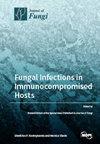真菌基因组中编码的天然产品生物合成多样性的全球分析
IF 4.2
2区 生物学
Q2 MICROBIOLOGY
引用次数: 0
摘要
真菌次生代谢物(SMs)是治疗药物的宝贵来源。基于基因组学的次生代谢物发现方法揭示了真菌基因组中巨大且基本未开发的生物合成潜力。在这里,我们利用 NCBI 公共数据库中公开的真菌基因组序列,以及 antiSMASH、BIG-SLiCE 等工具,分析了总共 11,598 个真菌基因组,识别出 293,926 个生物合成基因簇(BGC),随后将其归类为 26,825 个基因簇家族(GCF)。研究发现,在这些基因簇家族中,只有很小一部分(不到 1%)能与已知的天然产物(NPs)进行映射。一些内部只包含一个BGC的GCF对真菌生物合成的生物多样性至关重要。我们的分析得出了明显的模式,揭示了热门类群是实际和潜在生物合成多样性的主要来源。我们的研究还表明,GCF 的属级分布与 NP 多样性基本一致。值得注意的是,Xylaria、Hypoxylon、Colletotrichum、Diaporthe、Nemania 和 Calonectria 属似乎具有较高的 SM 合成潜力。此外,有 7213 个 BGC 与可能的已知化合物结构相匹配,而且知名药物的同源基因簇可能位于不同的菌属中,这有助于开发与这些药物结构相似并可能具有类似生物活性的衍生物。我们的研究展示了具有挖掘潜力的各类真菌,有助于研究人员确定研究工作的优先次序,避免重复挖掘已知资源,进一步探索真菌 NP 生产者。本文章由计算机程序翻译,如有差异,请以英文原文为准。
Global Analysis of Natural Products Biosynthetic Diversity Encoded in Fungal Genomes
Fungal secondary metabolites (SMs) represent an invaluable source of therapeutic drugs. Genomics-based approaches to SM discovery have revealed a vast and largely untapped biosynthetic potential within fungal genomes. Here, we used the publicly available fungal genome sequences from the NCBI public database, as well as tools such as antiSMASH, BIG-SLiCE, etc., to analyze a total of 11,598 fungal genomes, identifying 293,926 biosynthetic gene clusters (BGCs), which were subsequently categorized into 26,825 gene cluster families (GCFs). It was discovered that only a tiny fraction, less than 1%, of these GCFs could be mapped to known natural products (NPs). Some GCFs that only contain a single BGC internally are crucial for the biodiversity of fungal biosynthesis. Evident patterns emerged from our analysis, revealing popular taxa as prominent sources of both actual and potential biosynthetic diversity. Our study also suggests that the genus rank distribution of GCF is generally consistent with NP diversity. It is noteworthy that genera Xylaria, Hypoxylon, Colletotrichum, Diaporthe, Nemania, and Calonectria appear to possess a higher potential for SM synthesis. In addition, 7213 BGCs match possible known compound structures, and homologous gene clusters of well-known drugs can be located in different genera, facilitating the development of derivatives that share structural similarity to these drugs and may potentially possess similar biological activity. Our study demonstrated the various types of fungi with mining potential, assisting researchers in prioritizing their research efforts and avoiding duplicate mining of known resources to further explore fungal NP producers.
求助全文
通过发布文献求助,成功后即可免费获取论文全文。
去求助
来源期刊

Journal of Fungi
Medicine-Microbiology (medical)
CiteScore
6.70
自引率
14.90%
发文量
1151
审稿时长
11 weeks
期刊介绍:
Journal of Fungi (ISSN 2309-608X) is an international, peer-reviewed scientific open access journal that provides an advanced forum for studies related to pathogenic fungi, fungal biology, and all other aspects of fungal research. The journal publishes reviews, regular research papers, and communications in quarterly issues. Our aim is to encourage scientists to publish their experimental and theoretical results in as much detail as possible. Therefore, there is no restriction on paper length. Full experimental details must be provided so that the results can be reproduced.
 求助内容:
求助内容: 应助结果提醒方式:
应助结果提醒方式:


